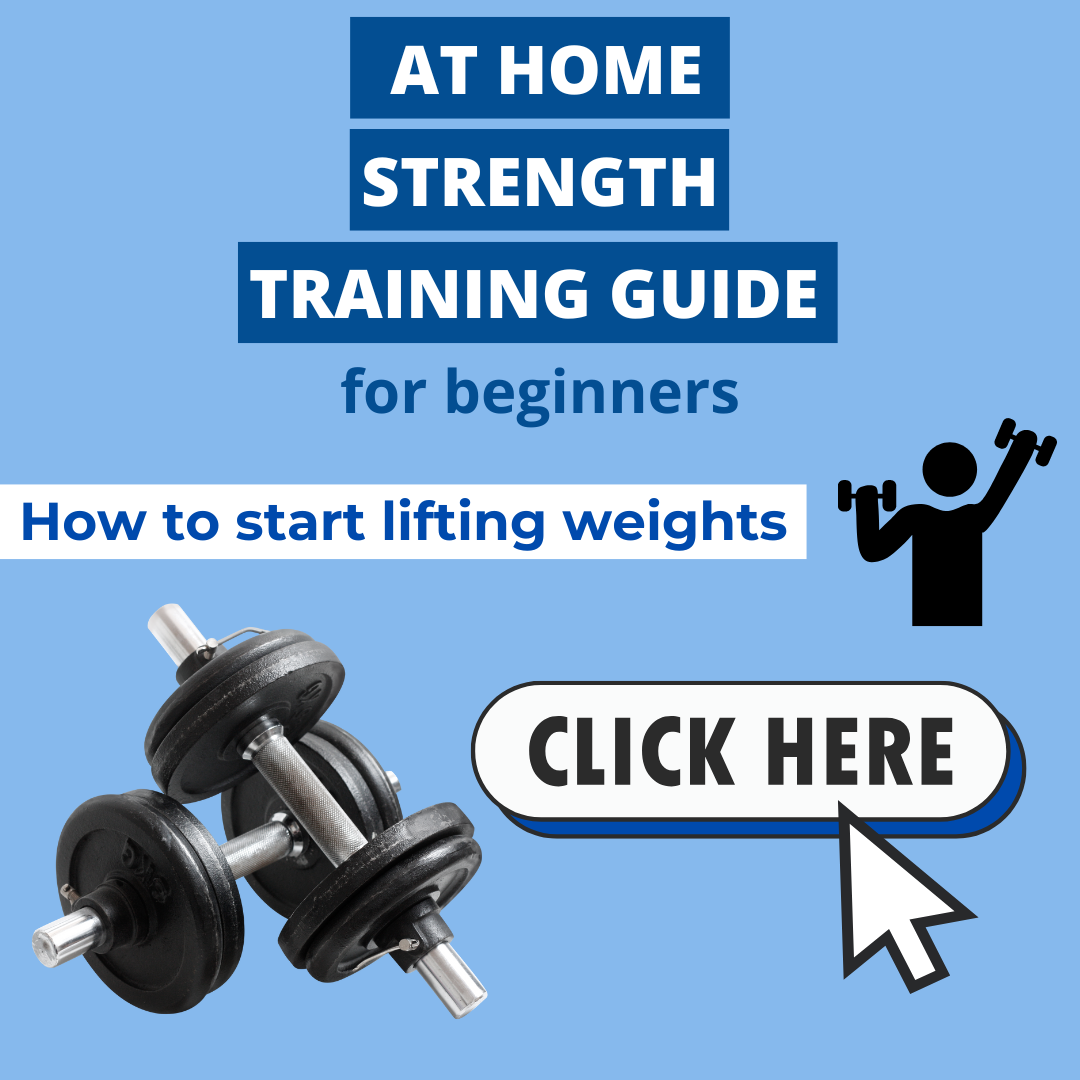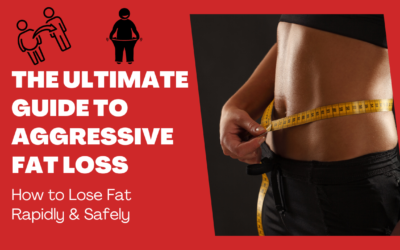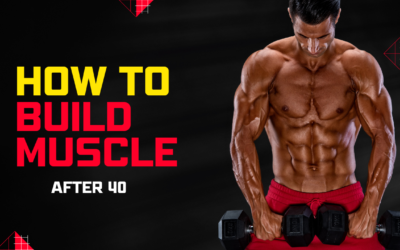20 Reasons Why Your Calorie Deficit Isn’t Working (Plus What You Can Do to Fix Them)

You’re dialed in on your workouts and nutrition so something just isn’t adding up…
How can you be in a calorie deficit but not losing weight?
If you step on the scale tomorrow and see that same stupid number you have been for the past month you’ll:
A.) Lose your mind
B.) Potentially lose your hair too from pulling it all out
Not seeing any results is driving you to the verge of insanity.
You feel like all your hard work has been for nothing.
As frustrating as it might be, you’re not a quitter though, are you?
I didn’t think so 💪
So don’t go throwing in the towel just yet.
I’ve outlined 20 reasons below to explain why you’re in a calorie deficit but not losing weight.
Why am I not losing weight in a calorie deficit?
1. You’re not truly in a calorie deficit
Thinking you’re in a calorie deficit and actually being in one are two different things.
So with that in mind, if you’re in a calorie deficit but not losing weight, guess what that means?
I hate to break it to ya but it means you’re not truly in a calorie deficit.
Claiming to be in a calorie deficit but not losing weight would be like saying 2 + 2 = 5.
It is scientifically impossible to be in a calorie deficit and not see results.
If you’re actually in a calorie deficit, your weight and/or measurements will be going down.
If neither of those are happening to you, you’re not in a calorie deficit.
There’s just no way around it.
2. You’re building muscle and losing fat at the same time
As a beginner to strength training, you might notice the scale just doesn’t budge at first.
Are you doing something wrong?
Why aren’t you seeing any weight loss?
Those are all common questions.
And the weird thing is, even though your weight isn’t going down, you’re looking leaner, more toned, and have more muscle definition.
Your clothes are fitting better too.
On top of that, your measurements have been decreasing.
If this is happening to you, you’re losing inches but not weight, which means you’re building muscle and losing fat at the same time.
A pound of muscle and a pound of fat both weigh the same amount (shocker, I know lol).
The reason the scale doesn’t move yet your measurements go down is because muscle takes up less space than fat.
But muscle is what gives you that more fit, defined look.
And that’s why you’ll notice changes when you look in the mirror or through progress pictures despite your weight staying relatively the same.
Inch loss = fat loss.
So just know you’re making progress, even if the scale doesn’t say you are.
3. You’re not tracking calories correctly
If you’re not seeing weight loss but haven’t been counting calories, start there.
Nutrition is the conductor of your weight loss train and counting calories ensures you’re eating the amount of food you should be to get results.
Let’s say you’ve been counting calories and still aren’t making any progress.
Are you tracking your food intake correctly?
When I say food intake, I’m talking about literally EVERYTHING.
If it goes in your mouth, it needs to be accounted for.
That includes things like:
- That extra chips you eat after already putting some on your plate.
- You licking the spoon for leftover peanut butter after already weighing out your portion.
- The handful of M&M’s you grab from your coworker’s candy jar whenever you walk by their cubicle.
- Liquid calories: I know, I know. It’s not fair that your morning Starbucks order contains calories (I mean, it’s just a liquid after) but it does.
- Measuring your food raw vs. cooked: There is a HUGE difference in calories between 4 ounces of raw chicken vs. ounces of cooked chicken. You should be weighing out your meat RAW. If you wait until after you cook it, you’ll be consuming more calories than you should be. Foods like rice and pasta are two other big ones you’ll want to pay attention to.
Another bite here or a few extra handfuls there might not seem like a big deal in the moment but over the course of an entire day, it can add up to hundreds of extra calories.
Which will lead you to believe you’re in a calorie deficit but not losing weight.
4. You need a little work in the consistency department
Consistency breeds results.
How consistent you are is a direct reflection of the results you achieve.
There are an infinite number of ways to say it but you get the point.
So if you think you’re in a calorie deficit but not losing weight, ask yourself:
Do my expectations align with how consistent I’ve been?
I got this little exercise from fitness trainer Jordan Syatt.
I’ve been doing it for the past year or so and it’s really opened my eyes to just how important staying consistent is for fat loss and achieving fitness goals.
It’s called a “consistency calendar” and here’s how it works…
At the beginning of each month, print out a physical calendar.
Don’t be lazy and say you’re going to keep track in your phone or in your head.
Actually get up and print out a physical copy of that month’s calendar.
Tape it up somewhere you’ll walk by multiple times a day….Your bedroom door, the refrigerator, etc.
On days you hit both (keyword: BOTH) give yourself an “X.”
When you don’t meet your workout and nutrition goals for the day, give yourself a “0.”
Just so we’re clear, you either get an “X” for the day or an “0.”
There’s no middle ground with this exercise, and that’s why it’s so good.
It’s simple and straightforward.
Either you hit your goals for the day or you didn’t.
By the end of each month, you’ll have an overarching view of how consistent you’ve been.
The last step is giving yourself a grade, so tally up all your X’s and divide that by the total number of days in that month to get a percentage.
For example, let’s say you’re tracking your consistency in November (30 days) and end up with 22 X’s.
You’d do this: 22 / 30 days in November = 73%.
Now, take whatever that percentage is and apply it this this grading scale:
- A: 90-100%
- B: 80-89%
- C: 70-79%
- D: 60-69%
- F: Below 60%
80% or a B- (which is roughly just 24/30 days of the month) is a solid benchmark to shoot for.
Notice how I said “benchmark.”
If you can be more consistent than that, by all means, go for it!
To go back to the question I asked you at the beginning of this section…
Do the results you’re expecting line up with how consistent you’ve been?
Motivational speaker, Eric Thomas, said it best:
“Don’t expect front row seats if you’re giving nosebleed effort.”
5. You haven’t been in a calorie deficit long enough
Know what Usain Bolt, widely regarded as the greatest Olympic sprinter of all time, said about achieving results?
“I trained 4 years to run 9 seconds, and people give up when they don’t see results in 2 months.”
Let that sink in for a second…
You get discouraged after a few days of not seeing these mind-blowing results and jump ship for yet another fad diet you saw on social media.
It’s time to be honest with yourself…
Has that strategy worked for you in the past?
Have you been able to lose those 20, 30, 40+ pounds you want and actually keep it off?
Or do you always seem to end up losing a little bit of weight but gaining it all back eventually?
One of the biggest weight loss mistakes you can make is expecting to see your body magically and sensationally transform overnight.
If you’ve been in a calorie deficit but not losing weight for a grand total of 2.5 seconds, take a deep breath innnnn.
Now breathe ooooouuuttt.
A calorie deficit doesn’t mean boom, snap your fingers, and then instantaneous fat loss.
Wouldn’t it be sweet if that’s how things worked?
All you need is a little bit of patience, that’s the key.
And if you think about it, this doesn’t just apply to being in a calorie deficit but it goes for anything in life.
You’re not going to be Jimi Hendrix after a few practice sessions on the guitar.
Beethoven after a few piano lessons.
Or Tiger Woods after a few rounds of golf.
It can take a little time to start to see the fruits of your labor.
General rule of thumb…
As long as you’re consistent with your diet and workout routine, you can expect about 0.5-2 lbs of weight loss per week.
6. You’ve set your calories waaaaay too low
1,200 calories a day…
Yeah, that’s not it.
Most toddlers would probably yell, kick, and scream if you fed them that few calories, so I know as a full-grown adult your hunger would have to be absolutely RAVENOUS.
Here’s why you’re in a calorie deficit but not losing weight on 1,200 calories…
1.) In all likelihood, you’re eating a lot more than the 1,200 calories you think you are.
2.) Let’s say that’s not the case and you’re truly only eating 1,200 calories a day.
The more you cut your calories, the more weight loss you’ll see, right?
Is that how you’re looking at things?
Sure, you might lose some weight for a little while.
But if you haven’t run into this problem already, trust me, you will.
You’ll soon find out that the whole 1,200-calorie crash diet thing just isn’t sustainable.
And if how you lose the weight isn’t sustainable, the results you achieve won’t be either.
Instead of slashing your calories super low, you want to take a more moderate approach to your calorie deficit (find your maintenance calories and reduce by about 20% to get the number of calories you should eat for weight loss).
7. You’re not getting enough protein
You have Batman and Robin.
Spaghetti and meatballs.
Zebras and stripes.
Protein and weight loss.
Get what I’m saying?
Seriously, I can’t stress enough just how important protein is when it comes to weight.
- It’s the most filling macronutrient
- You boost your metabolism just by eating it
- It is pivotal–and I mean PIVOTAL–to building/preserving muscle (having muscle also increases your metabolism and leads to greater fat loss).
0.7g-1g per pound of your goal body weight in protein daily is ideal.
So, for example, if your goal body weight is 150 pounds, you’d aim for between 105g–150g of protein every single day.
Don’t see how you’ll be able to get that much protein?
Or have you struggled in the past with your protein intake?
In this post, I go over 5 ways to help you get more protein throughout the day.
8. You need more fiber
When someone mentions fiber, your first thought is probably that it helps you poop.
You’re not wrong…
But there’s more to fiber than helping you push out a massive dookie that’s been giving you trouble all day at work 😂
Like protein, it’s extremely filling.
And the health benefits are OUT OF THIS WORLD.
- For every 7 grams of fiber you eat, you lower your risk of heart disease by 9%
- You lower your risk of breast cancer by 5% for every 10 grams of fiber you eat
- You reduce your all-cause mortality risk (chances of dying from virtually anything) by 19% when you regularly eat enough fiber
Foods rich in fiber:
- Berries (raspberries, blackberries, blueberries)
- Whole grains
- Oats/oatmeal
- Beans and lentils
- Avocado
- Almonds
- Pistachios
- Walnuts
- Chia seeds
- Sunflower seeds
- Pumpkin seeds
- Popcorn (without fats like butter or added sugar)
- Leafy greens
- Chickpeas
- Split peas
- Pears
- Artichoke
- Brussels sprouts
- Apples
9. You’re cutting entire food groups out of your diet
You know what’s cool about weight loss?
You don’t have to eliminate certain food groups or specific types of foods in order to see results.
You can eat fruit (It’s crazy to think about but there are actually people out there who say FRUIT, of all things, will just automatically lead to weight gain).
You can have foods that contain sugar or foods that are high in fat.
Once you realize there is no such thing as “good” or “bad” foods and that any food can be a part of a well-balanced diet, weight loss becomes a lot easier.
HOW MUCH food you consume in total determines whether or not you’ll lose weight.
There’s not some inherent, magical property in certain foods that’ll send your weight skyrocketing up.
Now…If a diet like keto, paleo, etc is something you envision yourself sticking with long term (i.e. for the next 10, 15, 20 years), then, by all means, do you.
But if you can’t see it in your future, then don’t eat that way for even a single day.
Why?
I mentioned this previously but if your eating habits aren’t sustainable over the long haul, then your results won’t be either.
10. Your weekends get out of hand
You make it to the end of the week and since you worked so hard, it’s only right you get to celebrate a little and relax.
You have a weekly “cheat meal” (or few) where you don’t log your calories and you step out for a night of drinking with friends.
But here’s the thing…
Your body doesn’t stop counting calories just because it’s the weekend.
Going buck wild can easily undo all the hard-earned progress you made during the week.
So if you think you’re in a calorie deficit but not losing weight, take a look at your Friday after work through Sunday.
Are you restricting yourself so much during the week that you feel like you need a release once the weekend rolls around?
Try to make things look more like this: 🥗🍟🏋️♀️🥗🏃🏾🌮🥗🥗🏋️♀️🍻
Instead of this: 🥗🥗🏃🏾🥗🏋️♀️🍕🍻🍔🍟🍾
Another thing you can try is calorie cycling.
With calorie cycling, you look at things on a weekly basis with your calorie deficit as opposed to daily.
You eat a little bit less some days and a little bit more on others.
As long as you’re in a net calorie deficit for the week, you’ll lose fat and see progress.
Which means you can set things up so your higher-calorie days are on the weekends.
It’ll give you a lot more flexibility to enjoy a night out with friends for some drinks, go out to eat, etc without feeling guilty.
11. You’re prioritizing cardio over strength training
This reason why you think you’re in a calorie deficit but not losing weight isn’t me putting down cardio.
Actually, walking (yes, this counts as cardio) is by far the easiest form of exercise you can do for weight loss.
And it has tremendous health benefits.
BUUUUT…
Cardio can’t help you build muscle.
But you know what can?
The more muscle you have, the higher your metabolic rate and the more fat you’ll lose.
And when you focus on cardio alone, you’re punching a one-way ticket to the dreaded skinny fat body.
It’s the one where you look in the mirror at your physique and think to yourself, “Well, I’m not necessarily obese or anything like that.”
But at the same time you’re softer and pudgier in places you definitely don’t want to be.
I’m going to assume you don’t want that…
At the end of the day, your workout plan should have a mix of both cardio and strength training.
But the lifting weights piece needs to be a central part of your routine.
The following don’t count as true strength training:
- A random set of HIIT workouts you pieced together from social media
- Orange Theory
- Boot camp-style workout classes
- Pilates
- Doing glute kickbacks on the StairMaster with a band wrapped around your legs (READ THIS ARTICLE if you want to grow your glutes)
Also, don’t think switching up your workouts every time out “confuses your muscles” and leads to more progress.
You make progress and achieve the best results by applying progressive overload (gradually increasing the amount of weight you lift over time) to the same set of lifts for 8-12 weeks at a time.
You can take a stab at it yourself and use THIS POST about how to create your own customized strength training workouts.
Or…
If you want all the guesswork taken out for you in terms of your workouts (and your nutrition too)…
If you want someone who’s going to be there for you every step of the way to guide you, help you, teach you, hold you accountable, and answer any questions you have along the way…
You can hire me as your coach 🙂
12. You’re focused on how much you sweat during your workouts
Sweating isn’t an indication of fat loss.
It’s just your body’s way of cooling itself down internally.
Some people sweat a ton.
Others…Not so much.
Things like sweating, being out of breath, or feeling sore the next day don’t mean your workouts are a success.
Want to know what does?
I wrote this article to help you determine if your workouts are effective so you can see the results you want.
13. You’re not getting enough sleep
If sleeping was an event in the Olympics, I’m confident I could take home the gold medal 😂
Which is great, because sleep is super important for weight loss.
Lack of sleep causes your body to produce more hunger hormones and decrease hormones that make you feel full.
When you get hit with that double whammy–increased hunger and feeling less full–it increases your chances of overeating and not sticking to your calorie deficit.
Participants who only slept for 4.5 hours a night consumed 14% more calories than those who got 8.5 hours of sleep each night.
14. You’re eating back calories burned from exercise
You know those exercise calories in apps like MyFitnessPal or your smartwatch?

Yeeeeeah…
If you think you’re in a calorie deficit but not losing weight, stop eating back calories you burn from working out.
15. You assume “healthy” eating means automatic weight loss
Remember…
If you’re in a calorie deficit but not losing weight, it can only mean one thing…
You’re not truly in a calorie deficit.
If you were, either your weight and/or measurements would be decreasing.
One mistake that’s easy to make is thinking “healthy eating” will just lead to weight loss no matter what.
But eating “clean” doesn’t automatically mean weight loss.
HOW MUCH you eat is still rule #1.
Here’s your nutritional blueprint on how to eat for fat loss.
16. You don’t give yourself any diet breaks
How long you should stay in a calorie deficit depends on a variety of different factors.
But the fact still remains, you can’t be in one forever.
You’re playing the long game here and going for something that’s sustainable.
So at some point, you’ll want a break so you can step back and recharge your battery.
You can do that using refeed days and diet breaks.
Refeed days
You take one or two days out of the week to eat at your maintenance calories or in a small surplus.
Diet breaks
Every so often, you take a week or two and eat at maintenance or slightly above.
Don’t treat these days or weeks like you’re first in line at the buffet.
You’re still counting your calories, tracking your macros, etc.
Refeed days and diet breaks are just planned ways to give your body/mind a break and help you refresh.
17. You’re restricting yourself way too much
Unseasoned chicken, rice, and broccoli for every meal…
That doesn’t exactly sound too appetizing, does it?
I used to think weight loss meant extreme sacrifice and only eating boring, flavorless meals like chicken rice, and broccoli.
There wasn’t room for any of the foods I loved, like Little Debbie Honey Buns or Grippos barbecue potato chips 🤤
It’s no wonder why I’d always struggle to maintain my diet.
The same thing happened every single time:
- Restrict myself from my favorites
- Cave on my diet and binge on all the foods I’d cut out
- Feel guilty and repeat the cycle
Perhaps you’re in the same boat…
And if you are, I’m here to tell you it doesn’t have to be that way.
The truth about weight loss is you won’t see much if you’re always feeling deprived and miserable.
Research shows flexible eating actually leads to more weight loss than crazy restrictive dieting.
A good rule to follow for balanced eating is the 80/20 Rule:
Get 80% of your calories from nutrient-dense whole foods like chicken breast, eggs/egg whites, fruits, veggies, etc.
Then, put 20% of your calories toward anything you want.
It could be cookies, cakes, chips, milkshakes, pizza, burgers.
Literally, whatever.
Use this WEIGHT LOSS GROCERY LIST on your next trip to the store.
18. You’re looking for a quick fix
Do unicorns exist?
No?
Neither do shortcuts or quick fixes when it comes to weight loss.
Ditch the fat burner supplements, “metabolism-boosting” detox teas, or that secret “hack” you saw online promising to help you blast away stubborn belly fat (by the way, you can’t target fat loss in specific areas).
The truth is:
There’s no secret to losing fat.
And there isn’t some magic quick fix pill you can take to speed things up.
Instead of wasting time feeling like you’re stuck in a calorie deficit but not losing weight, put your energy and effort toward being more consistent with the basics:
- Nutrition: Figure out the number of daily calories you should eat for weight loss. I linked to this article previously that will show you how to do that but here’s that link again: HOW TO DETERMINE YOUR WEIGHT LOSS CALORIES.
- Workouts: Lift weights 3-4 times per week to build a fitter-looking physique with muscle definition and tone.
- Daily movement: Get between 7,500-10,000 steps every single day. Walking daily is not only fantastic for your health but it’s a way to burn some more calories and promotes recovery too.
19. You may need to recalculate your deficit calories
If you think you’re in a calorie deficit but not losing weight, you might be at a point where you need to reassess how many calories you should be eating.
You’re weighing yourself every day and for a while there, the weight was falling off.
But now, you notice the scale hasn’t gone down in a little bit.
What gives?
Well, the more weight you lose, the fewer calories you’ll need to continue losing weight.
Let’s say you start your calorie deficit weighing 200 pounds and eating 2,500 calories.
Eventually, you make your way down to 190 pounds.
If you want to continue losing weight, you wouldn’t eat the same 2,500 calories as when you started.
You’d need to eat less than that.
And again, that’s because your body requires fewer calories the less you weigh.
Because your body now requires fewer calories in order for you to keep losing weight.
20. You have a medical reason that makes weight loss more difficult
I purposely made this one last on the list of reasons you think you’re in a calorie deficit but not losing weight because people can be quick to say, “I must have a medical condition that’s preventing me from losing weight!”…Just because they aren’t seeing the results they want.
The majority of the time, this just won’t be the case.
And the reason you’re not losing weight will probably come from an item on this list.
However, there are some instances where medical problems can impact weight loss:
For example:
- Diabetes
- An underactive thyroid
- Depression or mental health issues
- Insomnia
- Certain medications
That’s not a complete list by any stretch but you get the idea.
All of those can impact your ability to lose weight, whether that’s directly by slowing down your metabolism or indirectly by making you hungrier and upping the chances of overeating.
I do just want to point out that having a medical issue doesn’t totally disqualify you from being able to lose weight.
The above all else rule of weight loss still holds true:
You’ll lose weight as long as you consume fewer calories than you burn.
But a medical issue can make weight loss a little tougher to achieve.
If you think there may be a medical reason why you’re not losing weight, please consult your doctor!
Calorie deficit FAQs
Why am I gaining weight in a calorie deficit?
If you’re experiencing weight gain despite being in a calorie deficit, refer back to the #1 reason on this list…
You’re not in a calorie deficit.
Something’s off in your weight loss formula.
Ask yourself…
-
- How consistent am I with staying on top of my workouts and nutrition?
- Do I count calories to ensure I’m eating the correct amount for weight loss?
- Am I staying on track throughout the ENTIRE week or do the wheels fall off once Friday or Saturday rolls around?
Is it possible to be in a calorie deficit and not lose weight?
No, being in a calorie deficit but not losing weight (or inches) is scientifically impossible.
If you are truly in a calorie deficit, you’d be seeing a smaller number on the scale and/or a reduction in inches.
How can you be sure you’re in a calorie deficit?
The most obvious ways to tell are weight loss and inch loss.
But other signs you’re in a calorie deficit (which I talk about in THIS POST) might surprise you.
If you’re in a calorie deficit but not losing weight, can it be due to stress?
Stress itself doesn’t prevent weight loss or lead to extra body fat storage.
If it did, 95% of the population would be morbidly obese.
However, when you’re stressed, your body produces cortisol, which is a stress hormone that makes you hungrier and can lead to overeating.
So, in a way, stress may indirectly cause weight gain.
But again, just being stressed doesn’t.
Can eating “too few” calories lead to weight gain?
Ah, starvation mode…
This isn’t a real thing.
If you think you’re in a calorie deficit but not losing weight, it’s not because you’re not eating enough.
Think about people from impoverished countries who are legitimately starving, prisoners of war, or those with an eating disorder like anorexia.
Eating “too little” doesn’t prevent them from losing weight.
Be real with yourself…
Why would you be an exception to the rule?
How quickly will I lose weight on 1,200 calories a day?
- Try feeding a toddler just 1,200 calories a day and see how fussy they are.
So what are you doing as a full-grown adult aiming to eat that little?
- Losing weight super fast and actually keeping it off are polar opposites.
As long as there are 7 days in a week, the whole 1,200 calorie a day crash diet method will always end up backfiring.
Instead of trying to lose weight quickly, focus on what you can do to actually sustain the weight you lose (i.e. take a more moderate approach to cutting your calories).
When can you expect to see results in a calorie deficit?
Weight loss isn’t linear and there are a lot of different factors that play into it.
But as a general rule of thumb, you can expect to see some type of results–whether that be weight loss, inch loss, or both–within about 3 weeks of being consistent with being in a calorie deficit.
What should you do if you get stuck in a weight loss plateau?
Make sure you’re actually stuck in a plateau first.
You can consider yourself as being stuck in a plateau if, over the past 3 weeks, neither your weight nor measurements have been going down.
And in that time span, you’ve been at least 90% consistent with your workouts and nutrition.
When I say consistent, that means:
- You’ve been tracking your calories correctly (i.e. weighing your food out in grams, accounting for all the little nibbles, bites, and snacks you have throughout the day, accounting for liquid calories and cooking oils, weighing out your meats raw instead of cooked, etc)
- You don’t just take weekends off
- You’re pushing yourself in the gym and not just going through the motions
If, after all that, you’re still not seeing results, do this…
Either reduce your daily calories by 100-200 or add 1-2 LISS (low-intensity steady state) cardio sessions for 20-30 minutes each to your week.
Do one first and then if that doesn’t work, add the other one on top of it.
If you do both at the same time, you may just end up doing more work than you have to.

What's up?
I’m Chad, I’m happy you’re here! I’m a certified personal trainer and my goal is to help you form practical, sustainable habits that lead to lifelong fitness results. If you want to lose fat, build muscle, and live a healthier, happier life then you’re right where you need to be. 💪🏾
Free resources
⬇⬇⬇







0 Comments